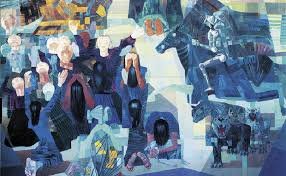
The State of Kant to Hegel
There are several interpreters who point out the fact that Rousseau intended to write  a work on “Political Institutions”, for example, in the author’s own work entitled Confissiones, which incurs the same error, we have already pointed out, to understand as natural what is cultural fact, Ideological and political.
a work on “Political Institutions”, for example, in the author’s own work entitled Confissiones, which incurs the same error, we have already pointed out, to understand as natural what is cultural fact, Ideological and political.
For it was in this way that a society marked by division and violence promoted in a special way by the state, natural means the coercive restraint of civil peace by the state, according to rules and laws, established primarily in what Montesquieu called the “Spirit of Laws,” or Either, nature would mean war, society would mean peace or, more precisely, security, which is not always the security of all.
There was a breach in Montesquieu’s view that he considered the virtual equalization of forces in which everyone felt equally threatened, Hobbes’s assumption, but did not indicate a more eminent tendency not to attack-that is, to avoid, And peace, not war, would be “the first natural law.”
This “paleolithic” passage from the state of nature to the “neolithic” state of the social state that impelled the impetus of selfish appropriation of natural goods, though called the social state, is nothing more than private appropriation of the public and vice versa, Because the private are only the masters of power themselves.
It is thus necessary to return to the beginnings of society and its formulation of the idea of the state, in Kant’s philosophy and his reflection on war and peace, his distinctive feature is how the system of ideas of his thought intrinsically attacked the binomial war And peace, to establish a point of view “of the objective conditions of establishing a state of peace among peoples, for him the place of necessity was occupied by war and not by peace.
This ideal “reality” was opposed by pious lamentations or exhortations of a moral order, such as the condemnation of war by Erasmus, where his anthropological-political horizon has the question of Peace as an imperative, but “must” stand for modern ideal reason.
Denying medieval metaphysics, his “project of perpetual metaphysical peace” in the critique of pure reason, is nothing but the limits of reason itself in the so-called “doctrine of law, a cosmopolitan project of universal peace, which will be what is known as” Peace Perpetua “, that two world wars proved ineffective.
Thus one can read the concept of nature hidden in Kant: “The history of the human species as a whole can be considered as the realization of a hidden plan of nature in establishing a perfect political constitution inwardly, and for this purpose “Also outwardly perfect, as the only state in which nature can fully develop in mankind all its dispositions. “(Kant, 2003, p.17)
The 1795 pamphlet “For Perpetual Peace. A philosophical project “one can have an articulated vision of Kant’s ideals about this, but it will be in Hegel that this project will be finished.









